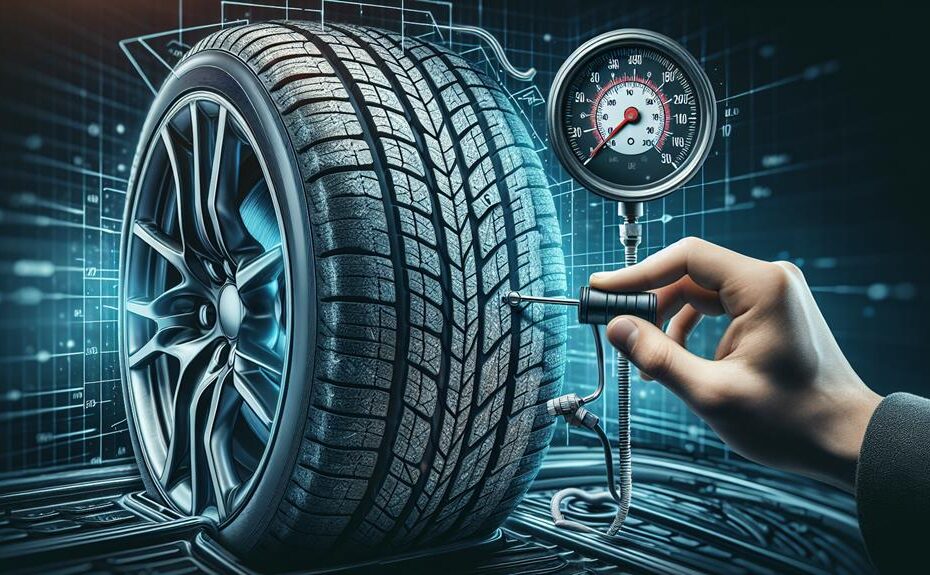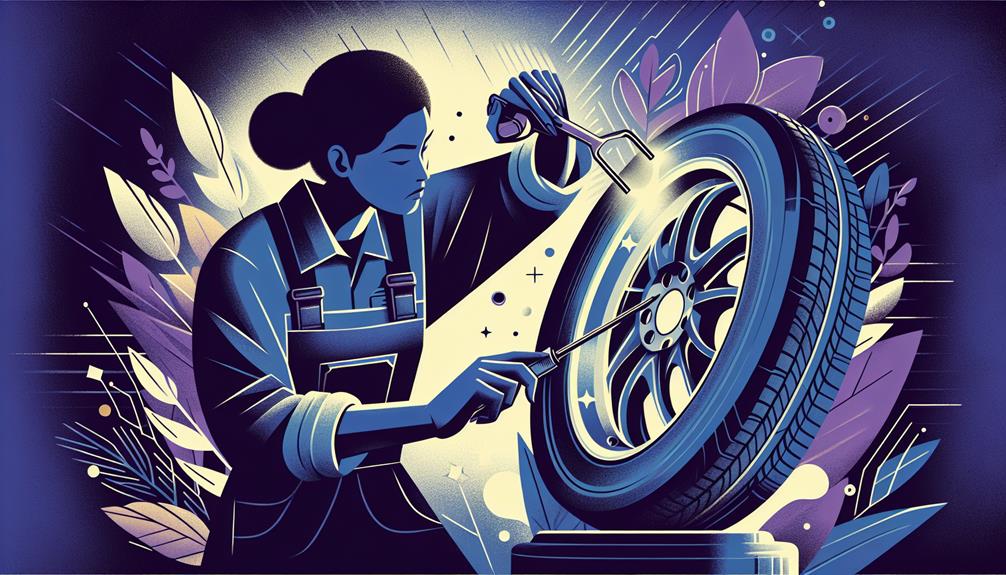You invested in a brand new set of tires, and now you want to make them last as long as possible.
Well, you're in luck because we've got five tips that will help you squeeze every last mile out of those rubber wonders.
From proper tire inflation to regular inspections, we've got you covered.
But that's not all, there's one tip that might surprise you.
So, buckle up and get ready to discover the secret to maximizing the lifespan of your new tires.
Proper Tire Inflation
To ensure the longevity of your new tires, it's essential to maintain proper tire inflation. Proper tire inflation refers to maintaining the correct air pressure in your tires. It's important because underinflated or overinflated tires can lead to various problems such as decreased fuel efficiency, reduced handling performance, and increased risk of tire failure.
To avoid these issues, regularly check and adjust your tire pressure according to the manufacturer's recommendations.
To begin, you need to know the recommended tire pressure for your specific vehicle. This information can usually be found in your vehicle's owner manual or on a sticker located on the driver's side door jamb. Once you have this information, use a reliable tire pressure gauge to measure the pressure in each tire. It's best to check the tire pressure when the tires are cold, as driving heats up the tires and can affect the readings.
If the tire pressure is too low, inflate the tires to the recommended level using an air compressor or at a gas station. If the pressure is too high, release some air until it reaches the correct level. Remember to check the pressure in the spare tire as well, as it's often overlooked but equally important.
Maintaining proper tire inflation is a crucial aspect of tire maintenance. By regularly checking and adjusting the tire pressure, you can ensure optimal performance, improve fuel efficiency, and extend the lifespan of your new tires.
Regular Tire Rotation
Maintaining proper tire inflation is crucial for extending the lifespan of your new tires. Another important aspect of tire maintenance is regular tire rotation. Tire rotation is the process of changing the position of each tire on your vehicle to ensure even tire wear. This helps to prolong the life of your tires and maintain optimal performance.
Here are four key reasons why regular tire rotation is essential for maximizing tire lifespan:
- Balanced wear: By rotating your tires regularly, you distribute the wear more evenly across all four tires. This helps prevent uneven tire wear, which can lead to decreased traction and handling.
- Extended tread life: Tire wear isn't always uniform, and certain tires may wear faster than others. Rotating your tires ensures that all tires experience similar wear, which helps to extend the overall tread life.
- Improved traction: As tires wear, their tread depth decreases. By regularly rotating your tires, you can help maintain consistent tread depth on all tires, resulting in improved traction and better performance in all driving conditions.
- Even tire performance: Uneven tire wear can cause vibrations and affect the overall performance of your vehicle. Regular tire rotation promotes even wear and ensures that all tires perform optimally, providing a smoother and more comfortable ride.
Avoid Aggressive Driving Habits
Are you wondering how to maximize the lifespan of your new tires? One important aspect to consider is avoiding aggressive driving habits. By steering clear of speeding and practicing gentle braking, you can significantly extend the life of your tires.
Speeding puts excessive strain on your tires. The faster you go, the harder your tires have to work to maintain control and grip on the road. This constant stress can lead to faster wear and tear, reducing the lifespan of your tires. By obeying speed limits and driving at a moderate pace, you can reduce the strain on your tires and ensure a longer lifespan.
Additionally, gentle braking is crucial for tire longevity. Slamming on the brakes causes your tires to skid and wear down more quickly. By applying gradual pressure on the brakes and allowing your vehicle to slow down naturally, you can minimize the stress on your tires. This not only extends their lifespan but also enhances overall safety on the road.
Maintain Proper Wheel Alignment
Proper wheel alignment is essential for maximizing the lifespan of your tires and ensuring optimal performance on the road. Regular wheel alignment is important because it ensures that your tires are properly aligned and in contact with the road surface at the correct angles.
Here are four signs of improper wheel alignment to watch out for:
- Uneven tire wear: If you notice that your tires are wearing unevenly, with one side wearing out faster than the other, it could be a sign of misalignment. This can lead to premature tire wear and the need for replacement sooner than expected.
- Vehicle pulling to one side: When your vehicle pulls to one side while driving on a straight road, it indicates an alignment issue. This not only affects your driving experience but also puts unnecessary strain on your tires.
- Steering wheel vibration: If you feel vibrations in your steering wheel, especially at higher speeds, it could be due to misalignment. This can also lead to uneven tire wear and affect the overall handling of your vehicle.
- Squealing tires: Improper wheel alignment can cause your tires to squeal, especially during turns. This is because the tires aren't gripping the road surface correctly, leading to loss of traction and potential safety hazards.
Regular Tire Inspections
To ensure the longevity of your tires, it's crucial to regularly inspect them for signs of wear and damage. One important aspect to check during tire inspections is the tire tread depth.
The tread depth refers to the measurement between the deepest grooves of the tire tread and the surface of the tire. Insufficient tread depth can compromise the tire's ability to maintain traction and control on the road, especially in wet or snowy conditions. As a general rule, tires should have a minimum tread depth of 2/32 of an inch.
To measure the tread depth, you can use a tread depth gauge or the penny test. Additionally, it's essential to inspect the tire sidewall condition. Look for any cracks, bulges, or cuts on the sidewall, as these can be signs of tire damage. Damaged sidewalls can lead to tire failure and potential blowouts.
If you notice any abnormalities, it's recommended to have your tires inspected by a professional to determine if they need to be replaced. Regular tire inspections will help you identify any issues early on and ensure the safety and longevity of your tires.
Frequently Asked Questions
Can I Use Winter Tires All Year Round?
You can use winter tires all year round, but there are drawbacks. Winter tires provide better traction in cold and snowy conditions, but they wear faster on dry pavement and can negatively impact fuel efficiency.
How Often Should I Check My Tire Pressure?
You should check your tire pressure at least once a month. Properly inflated tires improve fuel efficiency, handling, and overall tire lifespan. Regularly rotating your tires also helps to distribute wear evenly and prolong their lifespan.
Is It Necessary to Balance My Tires Regularly?
Yes, it is necessary to balance your tires regularly. Balancing ensures even weight distribution, which reduces uneven wear and extends tire lifespan. Additionally, tire rotation and proper alignment also play crucial roles in prolonging tire lifespan.
What Are the Signs of Uneven Tire Wear?
Uneven tire wear can be caused by factors like improper wheel alignment or under-inflation. To prevent this, regularly check tire pressure, rotate tires, and ensure proper alignment.
Can I Repair a Punctured Tire or Do I Need to Replace It?
You can repair a punctured tire, but it depends on the size and location of the puncture. Small punctures can often be fixed, but larger or sidewall punctures may require tire replacement.
Conclusion
In conclusion, following these five tips can greatly extend the lifespan of your new tires.
By maintaining proper tire inflation, regularly rotating the tires, avoiding aggressive driving habits, ensuring proper wheel alignment, and conducting regular tire inspections, you can maximize the performance and durability of your tires.
For example, a case study showed that a driver who consistently followed these tips saw a significant increase in their tire lifespan, resulting in cost savings and improved safety on the road.
- How Much Does It Cost to Fix a Sunroof: Expert Pricing Guide - May 18, 2024
- How Much is Oil Change at VW Dealer: Discover Cost-Saving Options Now! - May 18, 2024
- How to Calibrate Your Fuel Gauge: Step-by-Step Guide - May 18, 2024



